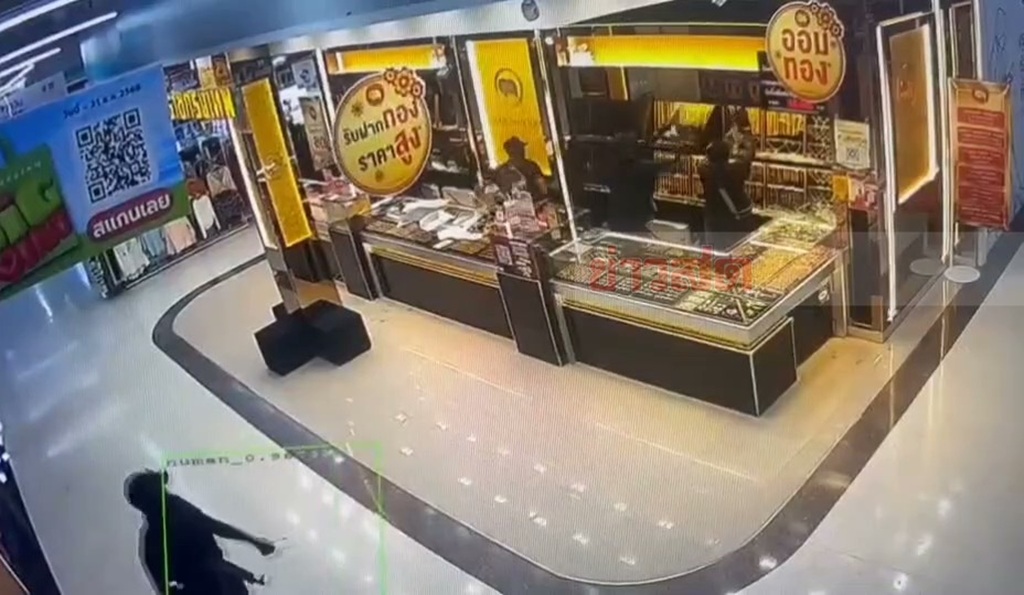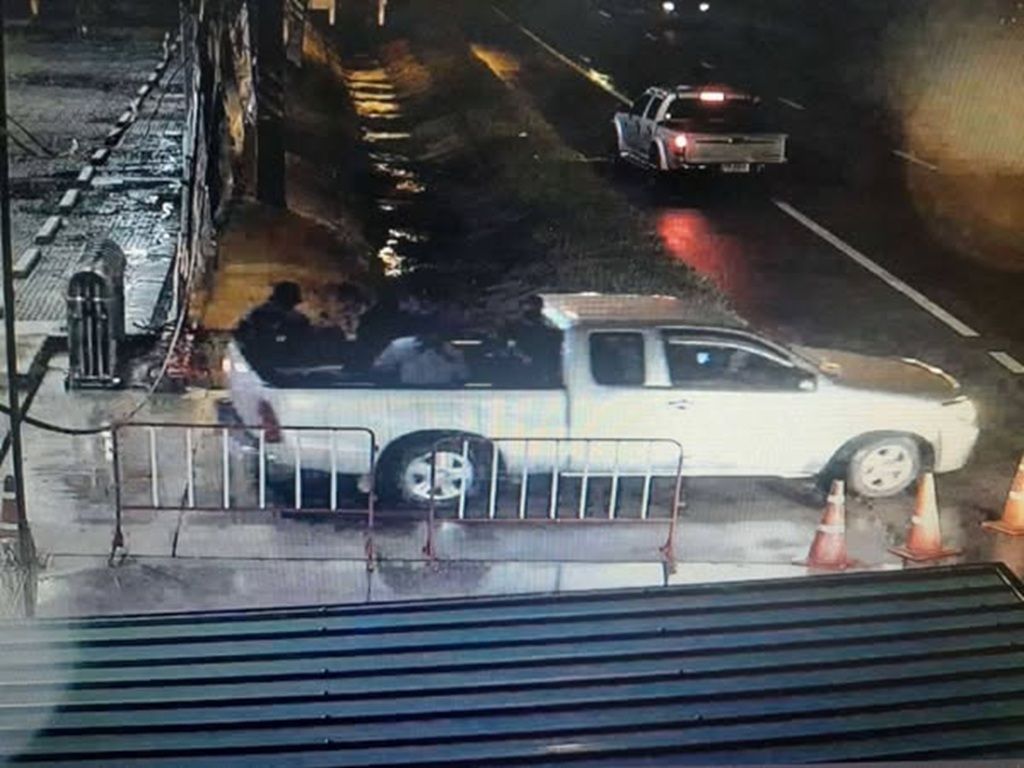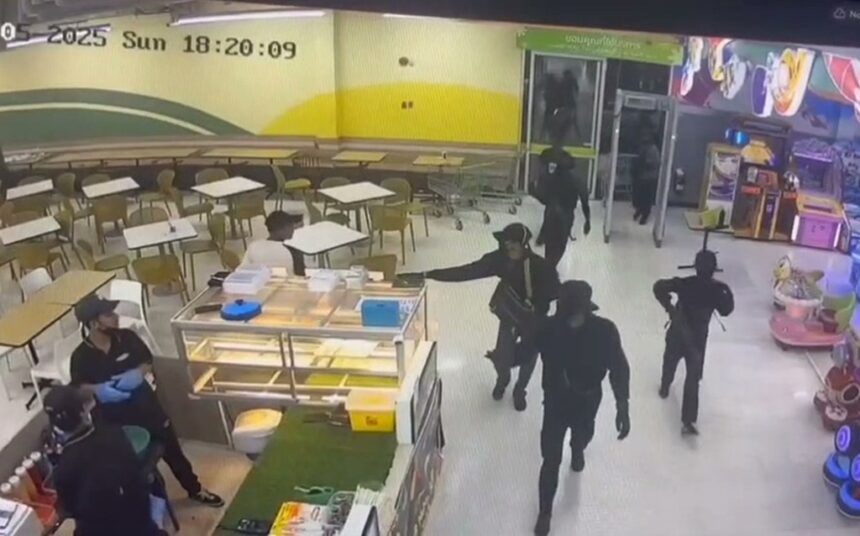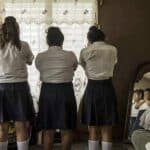NARATHIWAT — An armed group of eight men robbed a gold shop at the Big C in Su-ngai Kolok on Sunday evening, escaping with stock worth about $740,000 US dollars at current rates. The raid lasted less than five minutes, turned into a brief gunfight, and left a soldier injured as shoppers ran for cover.
Witnesses described panic inside the mall. The robbers, masked and dressed in dark clothes, entered the Yaowarat Bangkok Gold Shop at about 6.45 pm carrying rifles and pistols. They smashed display cases, then grabbed gold chains and bars and stuffed them into bags. Shoppers screamed, hid behind counters, and tried to flee as shots rang out.
As the gang left the store, they fired towards the concourse, which drew return fire from security staff. Sergeant Burisorn Radachai, 32, from the 408th Border Patrol Police unit, was shot in the shoulder while off duty. He had been buying groceries and stepped in to help.
Medics took him to Su-ngai Kolok Hospital, where he was treated and declared stable. No other injuries were confirmed, though the mall was cleared over fears that devices had been planted.
CCTV images show the thieves leaving in two white pickups and heading south, towards the Malaysian border about 10 kilometres away. The gang dropped tyre spikes to slow pursuit, then left a gas cylinder rigged as an improvised bomb near a U-turn outside the mall.
Narathiwat police EOD teams secured the scene and removed the device. A joint operation began at once, involving border patrol, military units, and regional detectives. Police Colonel Thawatchai Phuangmanee, superintendent of Su-ngai Kolok station, said investigators were checking number plates, road debris, and eyewitness accounts. He added that the raid appeared coordinated and well planned.
The loss, roughly 100 baht-weight of high-purity ornaments, reflects a wider pattern across Thailand. Robberies of gold shops have risen as prices hit fresh highs. Gold has surged in 2025, driven by global stress that includes trade tensions, inflation fears, and central bank buying. Spot prices moved above 3,800 US dollars per ounce last month, a jump of about 45 percent since January.

Even a small grab now brings a large payout. Authorities have logged a 30 percent rise in attempted robberies this year, with mall jewellers seen as softer targets due to open access and busy footfall. Economist Dr Pimchanok Pidkul of Chulalongkorn University said gold has become a lure for both organized crime and those under pressure.
Insurers in Pattaya and Bangkok have paid out more than 50 million baht since March, which has renewed calls for mandatory alarms, panic buttons, and trained escorts in retail districts.
Narathiwat felt the blow keenly. The province sits at the centre of Thailand’s long-running southern conflict, along with Pattani and Yala, where the population is largely ethnic Malay Muslim. Violence flared again in 2004 with the resurgence of the Barisan Revolusi Nasional and allied cells. What began as a push for identity and rights has mixed with smuggling, illicit trade, and extremist rhetoric. Over two decades, more than 7,700 people have died.
The Tak Bai tragedy in 2004, when 85 detainees suffocated during an army transfer after protests, still fuels anger and recruitment for hardline units such as Runda Kumpulan Kecil. In March, a bombing at a district office in Su-ngai Kolok killed two officials, showing the risk to civic sites.

Police have not linked Sunday’s robbery to separatist groups, and no statement or symbols were left. Even so, the border route and the slick execution have raised concerns. Local mediator Abdul Rahman said every act of violence in the area echoes the wider conflict. Poverty and slow development, with Narathiwat’s poverty rate near 23 percent, leave young men exposed to criminal networks and insurgent recruiters.
Talks between the Thai state and BRN factions, hosted by Malaysia, have stalled. Bangkok’s mix of aid projects and security laws draws fire from critics, who say it hardens distrust. Insurgents are also losing sympathy over attacks that harm civilians. Dr Pidkul said two decades of bloodshed have brought no clear gains for either side, only profits for those who thrive on instability.
As the town absorbs the shock, the Gold Traders Association has urged swift national support. The group wants grants for upgraded security in the south and tighter border checks to stop weapons and contraband.
Big C Su-ngai Kolok remains closed. The gold counters stand empty, the corridors quiet after a night of fear. In a region where gold promises safety yet attracts danger, the raid shows how fast fortune can turn when prices rise and security lags.














